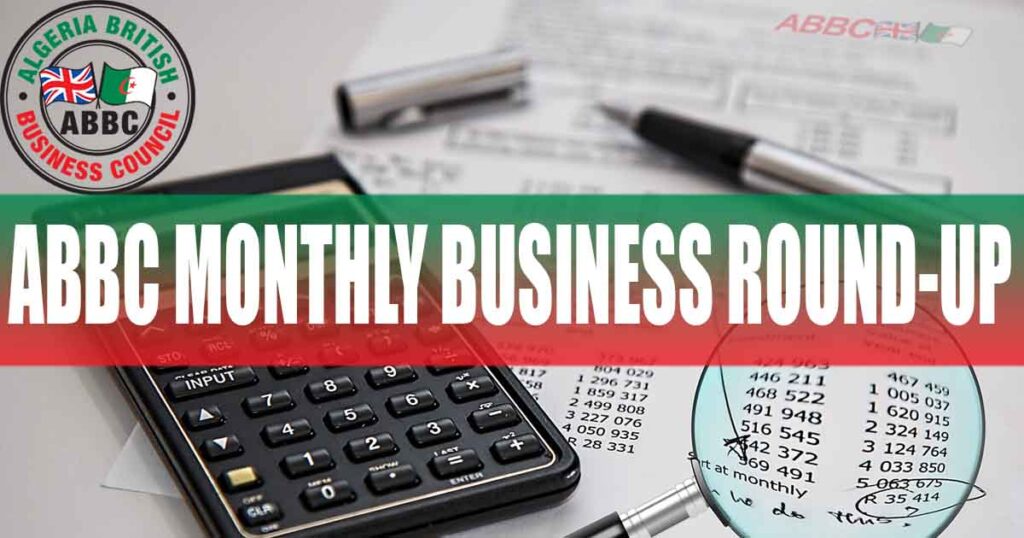- May 16, 2023
- ABBC admin
- Business Reports
- 0 Comments

Inflation remains high to start the year
According to the figures released during the month of April, inflation in Algeria remained high during February and March 2023, at 9.3% and 9.4% respectively. The price increases were primarily caused by the rising price of fresh agricultural products including fruit, vegetables and meat. The prices of processed foods, manufactured goods and services also rose, although to a lesser degree. The inflation rate announced by the ONS remains at an unusually elevated level since it hit 10.9% in April 2022. Inflation levels of this magnitude have not been since January 2013, when inflation reached 8.9%.
New monetary and banking bill signed off by parliament
On 11th April, Algeria’s National Popular Assembly (APN), the lower house of parliament, unanimously adopted the country’s new monetary and banking bill. The bill aims to modernise the country’s banking system, strengthen its role in regulation and oversight and bring it in line with international standards. It also aims to facilitate and accelerate financial transactions in line with the new investment law. Some of its more salient aspects include the strengthening of the Bank of Algeria’s governance, the creation of a national commission tasked with developing a new strategy for the adoption of payment methods by the general population, expanding the Bank of Algeria’s security and oversight prerogatives for payment systems, as well as the creation of new monitoring and control committees. The law also aims to regulate and promote the development of Islamic and green finance.
Before it was approved, the law underwent a series of amendments following the suggestions of the APN’s Finance Committee. These included a proposal to modify article 13 of the bill by introducing ‘three vice-governors of the Bank of Algeria instead of two vice-governors’. It also suggests amending article 26 by introducing ‘five members instead of four members during the meeting of the board of directors of the Bank of Algeria’. The commission also recommended amending article 112 so that ‘the banking commission may, in the event of failure by the auditors of banks and financial institutions to perform of their duties […] refer the matter to the National Accounting Council (CNC), which is the body empowered to apply disciplinary measures’.
According to the Minister of Finance Laziz Faid, the law ‘will make it possible to move towards the modernisation of the banking system and adapt it to current and future developments, particularly from a technological perspective with a view to ensuring a favourable climate for economic operators and providing them with modern banking tools’. The bill forms part of President Abdelmadjid Tebboune 54 campaign commitments with regard to the reform of financial governance in Algeria.
Authorities continue overhaul of import restrictions
In early April, the Minister of Commerce Tayeb Zitouni announced an overhaul of the online platform of the National Agency for the Promotion of Foreign Trade (ALGEX). The overhaul is intended to improve the digitisation of procedures to ensure better transparency and allow importers to track the progress of their various applications and submissions. Since early 2022, companies wishing to import products to Algeria have been required to obtain a certificate via the ALGEX platform confirming that the goods are not already available on the local market. The certificate system is designed to encourage local manufacturing and import substitution. However, anecdotal reports suggest that the additional processing times have led to some issues accessing imported goods, leading authorities to review the measures.
On 24th April, the Ministry of Industry and Pharmaceutical Production announced that a meeting would take place imminently between the Ministry, representatives of the ALGEX and economic operators to allow for ‘better regulation of imports, which cannot be done to the detriment of national production and market stability’.
Preparations underway for electricity exports to Europe as new solar tender planned
Also in early April, the Minister of Energy, Mohamed Arkab, announced that preparations, studies, and efforts are underway with ‘European partners’ to undertake maritime exports of electricity to Europe. He emphasised that this energy would be produced from natural gas and future solar power plants.
Later in the month, the Green Energy Cluster Algeria announced that an invitation to tender to build solar power plants with a total capacity of 2,000 MW would be launched in November 2023. The Chairman of the Board of Directors of the cluster Mehdi Bendimerad and its Managing Director Boukhalfa Yaici had met with the Minister of Energy and Mining, Mohamed Arkab, on 13th April. During the meeting, several points relating to the development of renewable energies in Algeria were discussed, including the launch of the new invitation to tender. According to the cluster, funding for the invitation will be provided via a ‘state grant’. The news of the new solar tender follows the launch, in March 2023, of an invitation to build 15 photovoltaic solar power plants with a total capacity of 2,000 MW. The solar power plants, with a capacity of 80 to 220 MWc each, will be located in 11 wilayas across the south of the country.
